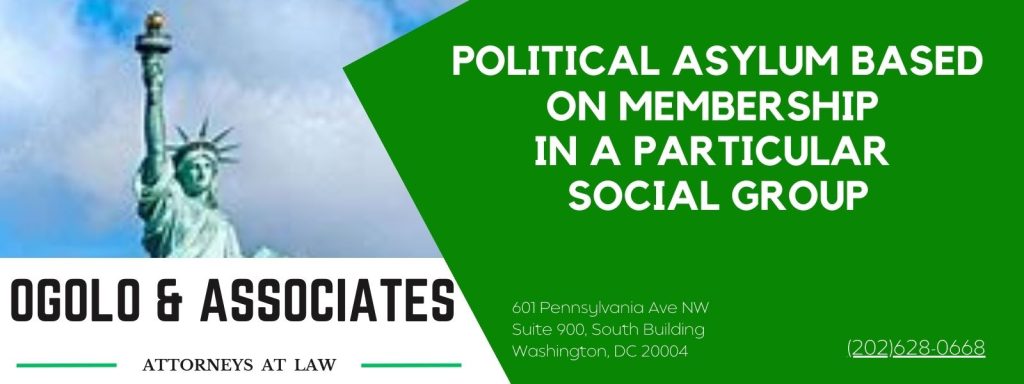An applicant for political asylum must meet the definition of a Refugee. To meet that definition, the applicant must demonstrate that he or she is an alien outside his or her country of nationality and is unable or unwilling to return to, and is unable or unwilling to avail himself or herself of the protection of that country because of past persecution or a well-founded fear of future persecution on account of, at least, one of the following grounds:
-
Race
-
Religion
-
Nationality
-
Membership in a particular social group, or
-
Political opinion
Where the basis for political asylum is “membership in a particular social group”, the applicant is required to clearly delineate on the record, the “particular social group” in which they claim membership. An applicant seeking to establish persecution on account of membership in a “particular social group” must demonstrate:
-
Membership in a group, which is composed of members who share a common immutable characteristics,
-
Is defined with particularity,
-
And is socially distinct within the society in question.
Membership:
Persons forming a particular social group must share a common immutable and/or fundamental traits. The shared characteristics might be something he/she was born with, is beyond the power of an individual to change or that is so fundamental to his/her identity or conscience such that it ought not be required to change. See the following example:
-
Gender, sexual orientation
-
Color
-
Kinship/family ties, or tribes or ethnic group
-
Shared past experience such as former property ownership, or
-
Gang or military conscription.
Particularity:
The “Particularity” requirement has been defined as “whether the proposed group can accurately be described in a manner sufficiently distinct that the group would be recognized, in the society in question, as a discrete class of persons”. Particularity requires that the group “must be defined by characteristics that provide a clear benchmark for determining who falls within the group” and that “the terms used to describe the group have, commonly accepted definitions in the society of which the group is a part.
Socially Distinct Within the Society in Question:
The extent to which members of a society perceive those with the characteristic in question as members of a social group, is of particular importance in determining whether an alien is a member of a particular social group. The requirement that, a group be socially distinct “considers whether those with a common immutable characteristics are set apart, or distinct, from other persons within the society in some significant way. In other words, if the common immutable characteristics were known, those within the characteristics in the society in question would be meaningfully distinguished from those who do not have the same.
Members of a particular social group will generally understand their own affiliation with that group, as will other people in their country. To be socially distinct, a particular social group must be perceived as s group by society. A group’s recognition for asylum purposes is determined by the perception of the society in question, not by the perception of the persecutor.
To have the “social distinction necessary to establish a particular social group, there must be evidence showing that society in general perceives, considers, or recognizes persons sharing the particular characteristics to be a group.
Governmental vs. Private Violence”
“Persecution” is something a government does, either directly or indirectly by being unwilling or unable to prevent private misconduct. An applicant seeking to establish persecution based on violent conduct of a private actor must show more than difficulty controlling private behavior by the government. The applicant must show that the government condoned the private actions or at least demonstrated a complete helplessness to protect the victim.
Persecution:
For the purpose of asylum on any of the statutory grounds, persecution is defined as “a threat to the life or freedom of, or the infliction of suffering or harm upon, those who differ in a way regarded as offensive. Persecution has three specific parts:
-
Persecution involves an intent to target a belief or characteristic – private criminals are motivated more often by greed or vendettas than by an intent to overcome the protected characteristics.
-
The level of harm must be severe
-
The harm or suffering must be inflicted either by the government of a country or by persons or an organization that the government was unable or unwilling to control.
Establishing Nexus between Persecution and Membership in a Particular Social Group:
Applicants for asylum must establish direct nexus between the persecution and the protected/statutory grounds, This is especially true where the basis for the application is membership in a particular social group. This is a critical step for victims of private crimes/persecution. If the mistreatment was motivated by something other than membership in that particular social group, then the application will fail, unless such persecution can be linked to any of the other statutory grounds.
Insufficient Basis To Establish Particular Social Group:
-
Past or present criminal activity or association;
-
Past or present terrorist activity or association;
-
Past or present persecutory activity or association;
-
Presence in a country with generalized violence or a high crime rate;
-
The attempted recruitment of the applicant by criminal, terrorist, or persecutory groups;
-
The targeting of applicant for criminal activity for financial gain based on perceptions of wealth or affluence;
-
Interpersonal disputes of which governmental authorities were unaware or uninvolved;
-
Private criminal acts of which governmental authorities were unaware or uninvolved;
-
Status as an alien returning from the United States
